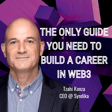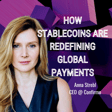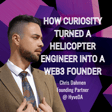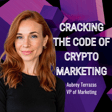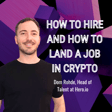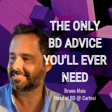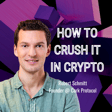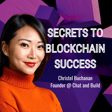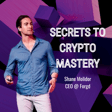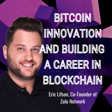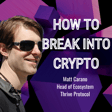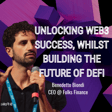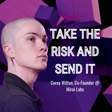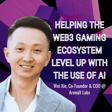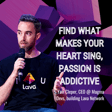Introduction and Importance of Communication
00:00:00
Speaker
Build stuff, have fun. I think those are two really good components and then talk about it. How did you learn to communicate effectively? Yeah, like for me learning is life.
00:00:16
Speaker
What advice would you give to people who are looking to get into Web3 for the first time and work for a Web3 company? If you cannot communicate well, if you put yourself out there in the community, I think is key. Usually this is actually very helpful or very valuable in my opinion.
Guest Introduction: Philipp Hoiberger
00:00:33
Speaker
Hello and welcome to the Behind the Blockchain podcast. Today I'm joined by Philipp Hoiberger, senior engineer at Toucan Protocol. Philipp, welcome to the podcast. How are you? I'm good, I'm good. Thanks for inviting me.
00:00:46
Speaker
No, thank you for being here. Thanks for being here. So people who don't know who you are, could you give us a bit of an introduction?
Philipp's Passion for Coding and Career Journey
00:00:52
Speaker
Yeah, I am Philip, as you said, and I'm a lead engineer at Toucan and I really like to code.
00:01:03
Speaker
And yeah, that's what I've been doing for the past, I don't know, 25 years-ish, I don't think, I think. Yeah, I've been coding since I was, I don't know, 11, 13, something around that age. So yeah, this is kind of my passion. And even if nobody were to pay me for it, I would probably still do it.
00:01:31
Speaker
It's good. That's how you know it's a question. Yeah. So why did you take an interest in software engineering in the first place? It's a very good question. I think it's so many interesting problems to solve and just to like with a couple of keystrokes, you're able to
00:01:53
Speaker
let a machine do your bidding, if you will. I mean, that sounds weird, but it's really, it's this powerful feeling that you get when you can create something out of nothing almost. And yeah, I personally, for example, I started coming from the game development area or I had an interest in game development initially. And when I was young, I
00:02:23
Speaker
programmed a few like super simple games and really Yeah, that was really enjoyable and that was really What what's the word enjoy God? enjoyable exactly not enjoyable Yeah, that was really enjoy enjoyable for me to
00:02:45
Speaker
to see something on the screen, to be able to move something on the screen. And this is, I think, how I got into coding. And then at a very young age, I actually told my parents that I want to study computer science. I think I really literally said it when I was 13, to become a computer scientist or whatever. And this is
00:03:10
Speaker
Yeah, yeah. It was crystal clear for me. Many people at my age, they didn't even know what to do. And even later in life, many people didn't know which direction to go. And for me, it was always crystal clear. I'm always going to do something with computers. And that's what I did. And yeah, I hadn't regretted it for a single moment. That's cool. That's cool.
Early Career and Mobile Development
00:03:34
Speaker
So could you talk us through your career journey so far then? So from kind of first, first role to now?
00:03:41
Speaker
Yeah, I think I'm a bit of a jack of all trades and I've been all over the place almost. During my studies I did an internship at a subsidiary of Volkswagen
00:04:00
Speaker
And they developed technology for the car. For example, the first lane assist software for those Volkswagen cars or park assist software, stuff like that. And I was doing my internship there and got a look into model-based development, which means literally they sit in front of the computer, they don't really type.
00:04:28
Speaker
the code, they have huge diagrams in front of them, and they connect like one box to another. And basically, yeah, they model the whole thing visually. And then in the end, like there's a super efficient, I don't know what it is, cross compiler or something that turns that into super efficient C code that goes into the car.
00:04:55
Speaker
So that was my first professional gig, if you will. And then I did a few things and for a long time actually did mobile development. Android first and then iOS later. And all in all, I think that's
00:05:20
Speaker
I think maybe 10 years I did that, which is a super long time, maybe less, maybe eight or so, doesn't matter. And yeah, like at that time I also co-founded the company, which was also centered around an app idea. So the skill set was super handy. And yeah, like I did that for so long that I,
00:05:46
Speaker
kind of saw the rise and fall of mobile development, you could say, because like, I mean, obviously there's still mobile development going on, but it's definitely not as hot anymore as you very well know.
Transition to Backend and Full Stack Development
00:06:01
Speaker
And in the beginning, everybody was doing it. Everybody wanted to do an app. Every company thought they needed an app, even if it was completely pointless, even if it was just basically their webpage in an app or something like super
00:06:16
Speaker
Useless if you will, but there's still everybody needed to do it So this was basically the heyday and then people realized okay. This is not not as great as we thought it would be this is Not adding much value or whatever so people kind of lost interest in it a bit and for me it was also
00:06:40
Speaker
a little bit too much front-end heavy, and usually you have more interesting problems to solve on the back-end side. So I kind of then, at the end of that term, gravitated towards back-end development more, which then was... I don't know if that's maybe true in detail, but you can cut all of that out.
00:07:10
Speaker
There was an interesting, a friend of mine had this company, he runs a business and he knew this company and they needed a software to help them process large amounts of physical questionnaires. They physically sent them out to people
00:07:34
Speaker
And then there's questions that people can answer with their handwriting or in handwriting. And then there were some checkboxes and stuff like that. And they would send 100,000 of those things out, and they would receive 10,000 or 20,000 or 30,000 back.
00:07:58
Speaker
And obviously that's a lot of data that you have in physical form now. And in the end, your clients wants that data in digital form in Excel sheets or stuff like that. So they obviously have to go through every single questionnaire and record all the handwritten answers, record all the check marks and all that stuff. So that takes a long time. So I built a.
00:08:28
Speaker
a web app that helps you collect all the data that also does the check mark recognition for you. So you don't have to say, OK, well, the user selected 1A and 1B or stuff like that. So most of that stuff was recognized automatically. But obviously, the handwriting is too difficult still
00:08:55
Speaker
maybe nowadays it's better. You still have to kind of type that by hand. So because like some people have really bad handwriting. Yeah, I mean, if you saw mine, if you saw mine, the program wouldn't read it probably. So yeah.
00:09:15
Speaker
It's it's I mean it is what it is like like people people have like such a different Or handwriting are so different from one person to another. It's it's it's it's a really difficult problem to solve so yeah, they did that by hand, but Everything was loaded into this web app They could go from one questionnaire to the next and and everything was was was snappy and fast so It's it was super helpful for them
00:09:44
Speaker
to have this and basically they were my first customer but unfortunately they were also my only customer because it's extremely difficult to convince somebody to use their software if you're a nobody and especially those companies that need this kind of software they are kind of stuck in the past they are not really
00:10:11
Speaker
They don't really want to try new stuff. They want something from a known brand.
00:10:17
Speaker
where they know it works and where they know they have sales reps they can talk to and stuff like that. So it was very difficult. That's not part of this podcast, but this is where I learned full stack development and I had the entire backend running basically serverless on AWS, which was really nice because since it was only one client,
00:10:44
Speaker
they obviously they had like those German core working hours from let's say 8am to 5pm and then they would completely shut the computer off and there would be no workload after that. So having all that stuff serverless was great because I didn't have to pay for a server running after 5pm for example.
00:11:10
Speaker
so this is where I got like really deep into services architecture and the AWS stack and Obviously coming from from mobile development. I also learned a lot about front-end development JavaScript and HTML and then also again JavaScript for for coding all those lambdas and This is
00:11:40
Speaker
that this is the job that led me to another job at a
00:11:47
Speaker
at a SaaS company. The SaaS company's friends of mine found it and there I did also serverless architectures, for example, getting their email sending processes into serverless so they can be heavily paralyzed and taken out of their monolith, which was a huge workload before
00:12:17
Speaker
And then they they could at least like spin off that part which was generating Like quite a lot of traffic and they could expand it off into into their serverless containers so that I did that for for quite a while the disaster of and then I
00:12:41
Speaker
Yeah, like while I was at the SAS job, I kind of realized I really, really would like to do something in the climate tech space.
Interest in Climate Tech and Joining Toucan Protocol
00:12:51
Speaker
Because I'm a climate nerd, if you can say that. Like sustainability and that kind of stuff is really important to me. So I naturally gravitated towards that direction.
00:13:08
Speaker
Always thought, yeah, if a job were to come along that was in the climate tech space, I couldn't possibly say no. And at the same time, I learned more and more about blockchain technology. I have been
00:13:31
Speaker
kind of loosely in this space, not from a professional point of view, but obviously as a person following along or mining Dogecoin in 2014 or something, like stupid stuff. I knew what the space was about, but I didn't really follow along with Web3 development.
00:13:56
Speaker
that was kind of new to me at the time and I got into it and I did some research on it and I thought this is this is really interesting as everybody who's coming to this space thinks in the beginning like this is interesting you could solve solve all the world's problems almost you could do voting you could do I don't know whatever and it was really fascinating to me so I basically started
00:14:24
Speaker
to learn more about it, do little prototypes, tutorials, that kind of stuff. And then at the same time, almost, I stumbled over Klima and Touken, the Klima DAO and the Touken protocol. And I thought, this is really interesting.
00:14:52
Speaker
tackling a really interesting problem, meaning trying to have a carbon-backed currency. So I got involved in the Discord a bit and learned more about it. And then it was a huge coincidence that I met on Telegram the co-founder of Touken. And at the same time he told me, yeah,
00:15:20
Speaker
You know, we're looking for, like, he was just casually chatting to me, you know, okay, so what's your goal in Web3? What do you want to do? And I explained, yeah, I would like to work in Web3. Sounds like a really interesting space. And then he said, yeah, you know, we're looking for people right now.
00:15:41
Speaker
And he sent me the job offer and I looked at it and I thought, okay, what two can I i've heard of them before? And then I realized okay. Yeah, too. Can they okay? That's that's interesting um complete coincidence. Um, we we decided that we Will start on a kind of trial basis a freelance trial basis just to see How how we would work together because in the beginning I said I've done a
00:16:11
Speaker
some smart contract development. I've used hardhat and those technologies, but I haven't done it for long. I mean, at this point, I have maybe spent three months learning and using it. So I said, I'm actually not sure if I'm really the right fit. Let's just give it a try. And he said, yeah, I think that's a good idea. Let's just give it a try. And long story short, I'm still at okay.
00:16:36
Speaker
That's cool, that's cool. It's a good story how you got into Toucan, you know, get involved in the Discord and community and then just start chatting online to the founder and staff. You know, the whole community piece in Web3 is massive and not just to make projects successful or anything like that, but
00:16:54
Speaker
from a job seeker's perspective or someone looking to get involved in a certain project, put yourself out there in the community, I think is key. Chatting to the right people, being really helpful, getting involved in what you can do and this kind of stuff. I've heard a lot of people actually get their next position because of that or doing that exact thing. So yeah, it's powerful. Absolutely. And the space is so small that
00:17:21
Speaker
you have a realistic chance to actually meet influential people or you're not one of millions doing Java development, for example, but you're one of the actually few people who are kind of at the cutting edge or maybe even at the bleeding edge, who knows? And that is very special, actually. Yeah, I agree. I agree. So you've talked about the technical skills.
00:17:51
Speaker
the front end, the back end development, mobile development and smart contract stuff. What else do you think has kind of helped you? What are the skills have you learned along the way which have really helped you in achieving your current role or even previous roles? Is there anything more maybe the softer side or anything like that at all?
Networking and Communication in Tech Industry
00:18:11
Speaker
Definitely. I would say that I think many people would underrated
00:18:19
Speaker
But I personally think that networking is really, really important. It doesn't have to be super structured.
00:18:28
Speaker
But I see that with other people sometimes, they would be hesitant to call somebody up or to write somebody a message that they had a nice chat with, for example. Let's say you meet somebody at a conference and you have a really interesting conversation and you both go your separate ways.
00:18:53
Speaker
A few months later or maybe even a year later who knows you realize i have this person they have this really interesting they were working for this really interesting company or they have this really interesting contact they were telling me about something along those lines. Many people would then say i cannot possibly read that person they don't even know where i am.
00:19:16
Speaker
They would be annoyed that I'm stealing their time or something, but more often than not, personally, I've never even experienced anything else. More often than not, people are really willing to help you. They are really
00:19:35
Speaker
They're really friendly. Most people are actually really nice. You wouldn't believe. So I usually write those people just saying, yeah, you know, it's been a while I know. But yeah, we've talked about this and that. And I realize you're doing this. And I had this question. And then from this question, something else might develop. Who knows? Or it doesn't. Who knows? But maybe you reconnect. Maybe you have another nice chat.
00:20:04
Speaker
So yeah, there's not much that can go wrong. Maybe there's this odd person somewhere in the world that thinks, okay, weird, why are they writing me? Okay, could be, but usually this is actually very helpful or very valuable in my opinion. So networking is important and it's valuable and it is underestimated in my opinion.
00:20:34
Speaker
And the thing that is super important in most of the current day jobs is communication and
00:20:48
Speaker
I cannot stress this enough. It does not matter how good you are on a technological basis or how well you can code or how you are such a brilliant marketer or business development person. It really doesn't matter if you cannot communicate well, if you cannot communicate what your expectations are or
00:21:16
Speaker
what roadblocks may come up if you don't include people into your thought process, for example, and don't give them a chance to be on the same page as you are. Because otherwise, you will be always the person way in front of them. And they will always feel like you're dragging them behind you. And they will always think, OK, his or her hat is in the cloud. What are they doing?
00:21:45
Speaker
Uh, like what, what, what are the next steps? Like, what are we even doing? So communication is extremely, extremely important. And like from communication, you get teamwork and, and, and all those things, but I think it all starts with communication. Yeah, I agree. I agree. So how did you, this might be quite a difficult question to answer. How did you learn to communicate effectively?
00:22:13
Speaker
Ooh, yeah, that's really difficult to answer, indeed. Is it just a case of putting yourself out there in trial and error and you worked it out? Is it listening to podcasts, reading certain books and stuff? Is it just, yeah, like I said, just trial and error, see what works, see what doesn't? I think, yeah, trial and error. And always have a tendency to over-communicate and not under-communicate.
00:22:41
Speaker
Like, even if you share a little bit too much, obviously you shouldn't share everything you're doing, like every little detail. Nobody needs to know every little detail. But sharing more than you think you should share is probably a good approach. Because more often than not, you take stuff for granted. You are in your own head, obviously. And in your own head, everything makes sense.
00:23:11
Speaker
But to other people, they cannot see what's in your head. To them, it might not make that much sense, or they might not even expect you to do this one thing. Because for you, it's obvious. Obviously, I'm doing this task right now, because that's what I always do, or that's what people should be doing. Who knows?
00:23:36
Speaker
To other people, that might not be obvious, and they might be surprised, or they might have thought that you were doing another task, for example. So I think always share a little bit more than you think you should is a good metric, I think. And yeah, as you say, it's trial and error. I don't know if there are good books on the topic. Maybe there are. But reading books is one thing
00:24:04
Speaker
And really doing stuff is another. I have a feeling reading books is good to build an understanding for a topic or to see different perspectives. But reading a book is maybe not necessarily good in getting you to do something. It's not super actionable.
00:24:33
Speaker
So yeah i don't know if you want to understand the importance of communication and you don't see the importance of communication then reading a book is probably good because it will show you all the important things around that topic but to actually be more communicating you actually just
00:24:55
Speaker
need to do it. Maybe you set yourself a timer or I don't know, or put a sticky on your monitor, for example. Every time you look at the sticky, you share something. I don't know. I'm not a communications expert, as you realize by now. But yeah, I think trial and error is what's worked for me.
00:25:19
Speaker
Cool. So why did you, I know you briefly touched on it, but why did you initially take an interesting Web3 and blockchain itself?
Exploration of Web3 and Blockchain
00:25:29
Speaker
I think it was because of the interesting kinds of problems. It's
00:25:39
Speaker
It's solving and also the technology behind it is very interesting. It's really as simple as that. It's really like if something catches my interest and I kind of get fired up thinking about it or like playing around with it.
00:26:02
Speaker
then that's good enough for me to go into a topic and even go deep into a topic. For me, it's really that simple. I see something that's interesting, then I invest some time in it.
00:26:24
Speaker
and I play around with it and if it's still interesting then I will go deeper and play some more with it maybe build something more complex and if it's still interesting I will still go deeper and build maybe something even more complex and just play around with ideas and just try to learn as much as I can about it because
00:26:46
Speaker
To me, that's how I operate. I really, really, really like to learn stuff. I mean, my wife is laughing about me that I'm sitting in bed before going to sleep reading a book about software architectures or stuff like that. And she said, okay, this is what you do for fun. This is what you do to calm down or whatever. And I say, yes, exactly. I feel like reading this right now,
00:27:15
Speaker
This is exactly what I should be reading at this moment. So yeah, for me, learning is life. No, that's good. That's good. So could you talk me through what your current role entails in a little bit more detail? What does a day in the life of the lead engineer or a lead engineer or two can protocol look like? Yeah. So
00:27:45
Speaker
I am more on the backend side now. I don't do very much protocol work, if at all. Really, it would be only very small solidity functions that I would write, but mostly it's really
00:28:02
Speaker
For me, TypeScript, data acquisition, getting voluntary carbon market data, cleaning, transforming data, those are the things I do on a regular basis. And also, obviously, our protocol has this infrastructure harness around it. I mean, the smart contracts are obviously one thing. They are the core piece, if you will.
00:28:32
Speaker
But around it, there is lots of infrastructure code, setting permissions, administering smart contracts, getting information from the blockchain, like tons of different tasks.
00:28:50
Speaker
And for us, that's all hardhead code. So I'm also constantly in there refactoring that code or extending the code. But again, it's TypeScript. So for me, everything kind of revolves around TypeScript. I'm fairly deep in the TypeScript world. So for me, the normal day
00:29:15
Speaker
Is really like first of all working remote which which means like I'm working mostly from home but Going to the office every now and then but yeah, I'm like structuring my day Like fairly loosely
00:29:35
Speaker
and then writing code, doing code reviews obviously because we have a decent code review process and yeah that's
00:29:51
Speaker
That kind of stuff, then coding, then obviously a few meetings here and there, but not too many. We're not that heavy on meetings. We're very heavy on asynchronous communication. For us, important things are
00:30:07
Speaker
documented in our ticketing software and in Notion. It's not the classical 9 to 5 job where you go into the office and everything is centered around that and everything is kind of
00:30:25
Speaker
Crunched into this into this time frame like for me everything is this more loose like if I if I need to Go to the gym Like at lunch or around lunch or something that I just do it then Then I do my work like either in the morning or in the afternoon or in the evening or whatever like whatever the I have the time to do it and
00:30:52
Speaker
So everything is a little bit more loose and communications are async more than they are synchronous. Uh, lots of, uh, commenting on pull requests, lots of commenting in, in notion pages or in our, uh, linear, um, task tracking software. Um, and, but, but still obviously we have, uh, synchronous meetings, uh, just not like a lot of them. Cool. Cool. And.
Role at Toucan Protocol and Work Style in Web3
00:31:22
Speaker
Did you or did you have to change your mindset a bit coming from the web two world to coming into web three being engineering in the two different spaces? Is there a mindset shift at all? Um, for me, not really, you know, because I was, I was working a good chunk remote before and I think, yeah, I mean,
00:31:49
Speaker
You really have to look at the two aspects of it. One is how you work and the other thing is what you work on. Obviously what I work on is somewhat different, but not crazy different, I would say.
00:32:07
Speaker
Because as I said earlier, I still do data wrangling in TypeScript, which I have been doing before. And it's still, as I say, TypeScript and not a new language that I'm using right now. So on that front, not crazy much has changed. But the way how I work definitely has changed because it's
00:32:34
Speaker
Compared to previous jobs, at least for me personally, the work at Touken is more... I don't know if professionalized is the right word or I don't know how to properly say it but
00:32:54
Speaker
it's really like we have this triangular github workflow for example and I in the previous jobs that that either wasn't necessary or people didn't know about it or like they they thought they don't need it
00:33:11
Speaker
But there we have a really good setup with lots of automation and good integration. So this feels really, really professional. You would probably find the same setup in a bigger organization. So this is really awesome to have. And yeah, this asynchronous communication is great because you
00:33:42
Speaker
you have the information less in silos but more in the open like for example
00:33:50
Speaker
We document so many things like internal calls, external calls, taking proper notes, and documenting outcomes, next steps, and everything. So you can actually see what's going on and see where some discussions are headed, for example. See how some decisions were made just because everything is this documented async in Notion.
00:34:20
Speaker
Whereas if everybody like was just like if only the founders were potentially talking in a sitting together in the room and you would never know like what was the outcome of this or that decision or why was this decision made or what are the factors going into the decision. So that's very different actually to previous jobs for me.
00:34:46
Speaker
Okay, cool. Could you introduce us to Touken in a little bit more detail? Yeah. So Touken is an infrastructure provider in the voluntary carbon market on-chain space. Touken basically created this infrastructure for Veracredits to be bridged onto the blockchain.
00:35:12
Speaker
I don't know how familiar your listeners are with the voluntary carbon market. So I'll just briefly touch on it. There's two carbon markets. One is the voluntary carbon market and the other one is the compliance carbon market.
00:35:28
Speaker
The compliance carbon market would be, for example, Tesla getting basically a certain number of allowances. They can CO2 allowances. They can basically use, as any other car company, as any other car company too.
00:36:00
Speaker
They can either use them for offsetting their own productions or like as it is, or since it is Tesla, they don't use as much CO2 because the cars are electric. They can sell some of their credits that they were allotted in the first place. So this is the compliance market and everything is regulated around or everything is regulated by governments.
00:36:30
Speaker
And then on the other hand, you have the voluntary carbon market, which is as the name implies, it's completely voluntary. People pledge to offset their emissions either in full or partially whatever they think is best. And they do that by going to that market and buying
00:36:57
Speaker
however many tons of carbon emissions reductions as they need. So basically they do some estimations before maybe they get a proper science-based
00:37:17
Speaker
what's the word I'm looking for assessment or from a third party and like this third party may say you emitted 100 000 tons in the year 2022 or something and then they go and say okay well then
00:37:37
Speaker
we go to the voluntary recovery market and we buy 100,000 tons and then obviously they still have to decide what kind of projects they want to use because there's obviously different projects there's projects like solar panel installation like big solar parks for example or cook stove projects in Africa where they
00:38:07
Speaker
Yeah basically give people living in rural areas better cooking equipment so their co2 emissions are less for example stuff like that and then there's also like the really high end stuff.
00:38:22
Speaker
like carbon dioxide removal, either using machines to draw carbon from the atmosphere or using nature-based solutions. For example, KELP would be an interesting solution to bind CO2 from the atmosphere and have it sink to the ocean ground, and it will stay there for a thousand years. I don't know the details. How many years? Anyway,
00:38:52
Speaker
So yeah, long story short, I think I rambled on a little bit too much. Long story short though, Touken provides the infrastructure for those credits to come on chain. And in the beginning we did it with Vera credits. Vera is a standard and registry body that has
00:39:16
Speaker
millions of credits in their database, if you will, and our thinking was it would be much better to have those credits on the blockchain because it's transparent, it's open, people can see who's using what, who is retiring credits, and it's mathematically guaranteed to be
00:39:44
Speaker
Or it's mathematically guaranteed that you cannot have double spending. Double spending would be a problem that is actually, this is actually a problem in the traditional carbon markets where company A would claim carbon emissions reductions and
00:40:04
Speaker
For maybe some reason, maybe there was an error or something, maybe people didn't set correct flags on this data set, on this credit, for example.
00:40:18
Speaker
Company B was also able to claim the same emissions. And that's obviously a problem. If Company A claims the emissions, they need to be canceled out. Nobody else could then claim those emissions. But since it's a mutable database where those things are stored in the traditional market, it could very well happen. If people don't
00:40:45
Speaker
have really good code that prevents them to edit this data point, let's say, then double spending really might happen. Whereas in the blockchain world, it's mathematically proven. I mean, given the blockchain code is audited properly and it really works as it's intended to work, but then it's mathematically proven that you cannot
00:41:13
Speaker
it use this credit more than one time. So yeah, sorry, long story short. We are building infrastructure to bridge the voluntary carbon markets on chain to bring it into a more bring it into the digital era, if you will. That's cool. That's cool. So you've been you've been there for
00:41:41
Speaker
A little while now. I think I can't remember how long off the top of my head from your LinkedIn. Is it seven or eight months you've been at Toucan now? I think it's one and a half years or so. Oh, there you go. Yeah. And obviously Toucan was your first role within the Web3 space for what I understand.
Advice for Newcomers to Web3
00:42:02
Speaker
What advice would you give to people who are looking to get into Web3 for the first time and work for a Web3 company?
00:42:08
Speaker
Yeah, as we've talked about earlier, I would say, do learn about the space, build projects, because projects you can really share afterwards, you can share with interested parties. If it's just you basically reading stuff or just recreating those tutorials step by step,
00:42:38
Speaker
That is very difficult for somebody else to really gauge how how well you actually understood the thing you were learning about so my recommendation would be.
00:42:49
Speaker
to go out, do tutorials, no question about it. You need to start somewhere. But every time you do a tutorial or you build a little project, always deviate from the goal they're setting or from the solution they're giving you just to see if you can take this thing into another direction. Because this really shows that you
00:43:21
Speaker
understood what you were doing, that you were actually able to translate your learnings into something slightly different. And the more your experience grows, the more you learn about it, the more you will be able to deviate from those paths they give you in those tutorials, for example. And eventually, you don't need a tutorial at all, you just come up with something interesting that you
00:43:48
Speaker
want to build that you want to see in the world maybe it doesn't exist before or maybe you just recreate something which is entirely possible or which is totally fine like let's say you you create the on-chain twitter for example it really doesn't matter but like this is this is definitely a worthwhile thing to do because
00:44:12
Speaker
Once you do talk to people about getting a job or or having a trial phase or whatever it is or collaborating with them, then then you will need to show them that you actually know what you're doing. I mean, obviously you need to speak to them and and they will ask you questions and then you will have to convey that you do on a deep level understand what they require you to do or what they would hire you for.
00:44:42
Speaker
But having something out there, having something on GitHub that they can look at and see, what is your coding style even? This is not something you tell people about. You cannot really get to it in a discussion. But it's much better to see how somebody structures their code and get a feeling for how that person really
00:45:09
Speaker
works by looking at their code. So definitely have something out there to show people, even if it's just small things, even if it's not many things, but still have something out there. And then, as we've said, it's really easy nowadays to
00:45:31
Speaker
get involved with projects, for example. For example, I'm in this Discord in the Graph, a protocol Discord. I'm in there. The Graph is a really interesting and important piece of technology in the Web3 space. And there is not much going on. So if you went there and if you wanted to work for the Graph, let's say,
00:45:59
Speaker
then it would be super easy for you to take part in their hackathons to get in touch with the founders or people that have important positions in the company. And yeah, like basically step by step, getting to know them and if they know you, then they're more likely to look at your
00:46:26
Speaker
your application for example and then they will look at your code and maybe they have already seen your code because you've taken part in a hackathon or something
00:46:37
Speaker
It's so easy to get involved because there's not much traffic It's not like you go into the graph discord and there's like a hundred thousand messages per second flying by and you're You're you're just this one person who who who is drowned in all the noise? No, actually there's not much going on. So it's it's it's actually very easy for you to to to do that Okay, cool. That's uh, yeah, that's good advice good advice so um
00:47:06
Speaker
In your opinion then, what do you think are some of the challenges that we need to overcome before a lot of these web3 technologies like the graph and like you can for example become pretty mainstream?
Regulation and Scaling for Climate Change
00:47:20
Speaker
Yeah, I mean obviously public perception is something that's holding the space back. I mean we all know there's
00:47:34
Speaker
a lot of hacks or, yeah, like FTX. No, seriously, there are a lot of scams, which is unfortunate. And it kind of also it drags everybody down. I mean, it's dragging the meaningful projects, the good people down along with the whole rest. And
00:48:02
Speaker
That's obviously a problem. So I think there is no point in telling people to stop scamming people or anything of that sort. There is no point to it. I think the way we will evolve is through regulation. And I think this is what the space needs. I mean, sure, like maybe there are some utopian use cases that you
00:48:30
Speaker
potentially then couldn't do with more regulation. Maybe that's true, but on the other hand, the way it is right now with all the bad things happening, nobody will take the space seriously anyway, so your utopia wouldn't even come to pass no matter what.
00:48:54
Speaker
Regulation, I think, is the way forward. And with regulation, you will have big players because they can then build trust. They can then realize, OK, this is a space or a technology that we can rely on, and we will not get burned. So with those companies or bigger players adopting the technology or adopting the Web 3 space or the Web 3
00:49:23
Speaker
mentality, we actually have a chance to make it, if you will. For sure. And you mentioned something previously about when you were in mobile development, everyone wanting to create apps, even when they don't necessarily need them, they thought that they wanted one and everyone had to have it. Do you think the same thing will happen with blockchain to some degree?
00:49:48
Speaker
To some degree, it definitely will happen. And it's even happening. I mean, I don't know too much about it. But like, for example, I don't know if we need a blockchain-based social network. Maybe that's a really good idea, but maybe not. It's not a good idea. I definitely don't know about it too much to really have an opinion. But I think there's more things like that.
00:50:18
Speaker
People sometimes go in with the mindset, oh, I have this really interesting technology. What do I do with it now? Whereas they should be going in and saying, I have this problem I want to solve. I have the blockchain technology. Does this really solve my problem? Yes or no. If it does solve your problem, perfect. Use it. If it doesn't solve your problem, then maybe don't use it. It's actually that simple. And yeah.
00:50:46
Speaker
But because people go in and have this technology, same with AI, they want to do something with it and then they try to solve a problem or they try to come up with a problem, which maybe isn't even a real problem. So you have a lot of those same things where
00:51:04
Speaker
products are being built that don't really solve a real need or are not really important or worthwhile. For sure, for sure. So if you were given an unlimited pot of money then or a limited time, limited resources, are there any specific challenges you're seeing right now that you'd love to have a go at getting involved in?
00:51:34
Speaker
Yeah, so as you know, I'm on this mission already addressing climate change. This is super, super important to me. And this is super important to solve in or rather sooner than later. So I would I would stay in that space and I would with unlimited resources really scale the whole thing up and really see how we can go from
00:52:05
Speaker
just the refi people, the regenerative finance people to care about it, but go beyond that. For example, include policymakers more, maybe even do some lobbying, because this is how the industry, quote unquote, works. And really,
00:52:30
Speaker
Get like really built some more momentum to actually have systemic change compared to individuals just changing their their behaviors because that's good that Some people don't eat meat or that more people use their bike but it only can achieve so much we will never be able to
00:52:54
Speaker
convert everybody to use the bike or to eat less meat. But with policymakers being involved and policymakers really understanding how important this is and maybe even having some incentives, however they may look like, maybe we will figure this out exactly, that policymakers have incentives. I think this will
00:53:21
Speaker
I would really like to tackle this to facilitate systemic change. Cool. That sounds good. Is there anything in web3 as a whole that you would change or you don't agree with or you would change or anything like that? That's a good question. There's a lot of
00:53:48
Speaker
I mean, aside from the bad actors and the scams, obviously, I wouldn't change much, to be honest. I mean, obviously, we all need to realize that regulation is good for the survival. I mean, I don't want to paint it as dire as it may sound, but
00:54:18
Speaker
To really get mainstream adoption, I think regulation is key. So I would wish for people to first understand that and then secondly work towards that. And other than that, I think the space is great.
00:54:38
Speaker
I really like the energy and the momentum people are bringing. It's really refreshing. It really doesn't feel like a grind being in this space. First of all, people are really collaborative, which I very, very much like. They are social. They get together. They get fired up.
00:55:05
Speaker
And that's what I really like about the space. So I wouldn't change much, to be honest. I mean, from the obvious things, aside from the obvious things. No, that's good. That's good. Cool. So as a leader in Web3 then, what advice would you give to people who are looking to follow in your footsteps?
Encouragement for Future Web3 Leaders and Personal Reflections
00:55:35
Speaker
build stuff, have fun. I think those are two really good components and then talk about it. Either maybe on Twitter or write a blog about it or even just go into Discord and chat with people about the thing you've built. I think it doesn't have to be more complicated than that. This might be a tricky question just to finish off.
00:56:02
Speaker
Is there a piece of advice that you wish you'd have been told earlier in your career? So if you could go back now and speak to you, you know, 15 years ago, whenever, whenever it might be. Any piece of advice you'd love to give that person? Yeah, I think I like what I just said now, I should have taken that on board way earlier is
00:56:28
Speaker
to put more stuff out into the world because in the first let's say 15 years of my career I was only
00:56:43
Speaker
Working for companies that were the the the code was closed source. I didn't put much I didn't put many projects on to github Let's say to to show people what I what I do in my spare time for example so Yeah, like I would actually just go back and and tell myself that that that it's good to to to have something out there
00:57:12
Speaker
And everything else will just naturally fall into place almost. Yeah, I think it turned out well for me. So I wouldn't need to change much going back. So yeah, like this is the thing that probably would have made a difference to
00:57:37
Speaker
Yeah, I don't know, go other places or even go higher. Who knows? I don't know. That's good advice. Well, yeah, Philip, thank you very much for your time today. It was great to talk to you. It was a really, really interesting journey. Really, really, yeah, it gives really good advice. I think there's a lot of stuff there for people to learn from and a lot that people can take from that.
00:58:04
Speaker
If anyone has any questions, will they want to reach out to you? Are they okay? Just to, is it LinkedIn is the best place to drop your message and just have a chat. You know, if they want any extra advice on what you've said. Absolutely. Connect wherever you want with me. Could be LinkedIn. You can drop me an email. You will, do you link my, will you link my, my, my, my personal webpage? I think there's my email. Perfect. Perfect. And I,
00:58:31
Speaker
Uh, have my Twitter profile there. You can write me on Twitter. Um, yeah, like really wherever you are, just drop me a message. And, um, yeah, like if you have questions, I'm happy to help. I'm always happy to, to help people out, uh, with, with their journey. Um, yeah, that's what I really like to do. Great, great. Well, uh, well, yeah, thank you very much for your time. It was, it was a pleasure talking to you. So, um, yeah, thanks for inviting me.

